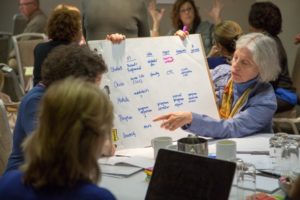
Conference attendees, from back row, left: Craig Pearson, Sue Brown, Jane Schmidt-Wilk, Isabel Matzkin, Paula Armstrong, Mark Ellinghaus. Front row, from left: Janice Denton (Assessment Academy Scholar and mentor to the group), Chris Jones, Amine Kouider.
A team of eight MUM faculty and administrators, led by Professor Chris Jones, attended a conference in Chicago in late October focused on student academic assessment. The event was sponsored by the Higher Learning Commission (HLC) of the North Central Association of colleges and schools.
The HCL is the agency responsible for the accreditation of colleges in the north-central U.S., which includes MUM.
The University gratefully thanks donors whose contributions helped make MUM’s participation possible.
The conference, called the Assessment Academy, is offered to institutions which are committed to creating comprehensive assessment systems with the aim of improving student learning (the Assessment Academy, however, is not officially a part of the accreditation process).
The ‘Quality Initiative’ Project
“What the Academy attempts to do is help institutions improve their assessment practices,” said Professor Jones, leader of the MUM team. At the event, faculty and administrators shared ideas and insights, and benefited from colleagues and experts in the higher learning community, many of whom brought significant experience in assessment.

Photo by Amine Kouider
Assessment is the focus of MUM’s Quality Initiative project, which is required as part of the University’s next accreditation visit, in 2020. “The purpose of this initiative is to improve student learning on campus by better equipping our faculty and administrators to assess outcomes,” said Professor Jones.
MUM began the four-year project two years ago and, in the most recent training session, team members evaluated their original plan and reported on progress made.
Three Levels of Improvement
The Quality Initiative project aims to improve the assessment of learning outcomes on three levels: in the classroom, in academic programs, and at the institution level.
Over the past two years, with the help of students, faculty, and administrators, the team has begun gathering evidence on student learning outcomes and, among other initiatives, introduced a student learning chart that will eventually become part of every class syllabus.
Nine essential learning outcomes were identified, which undergraduate students are expected to acquire by graduation. They are: the development of consciousness, health, holistic thinking, creativity, critical thinking, communication, problem solving, teamwork and leadership, and local and global citizenship.

Photo by Amine Kouider
“We want to make sure every course in every program supports these learning outcomes, through what we’ve called the curriculum map,” said Professor Jones. “By the end of the project, we want every program to have an assessment plan, which is their plan for measuring outcomes at the program level.”
The ultimate goal of the initiative is to help students make substantial progress in the achievement of the nine essential learning outcomes, as well as advance in other outcomes necessary for their academic program.
“The main point of this initiative is to improve student learning on campus by better equipping our faculty and administrators to assess student learning,” said Professor Jones. “You can’t ‘improve’ what you aren’t able to measure. Assessment is all about measuring learning. We look forward to continuing to improve at raising standards and improving student learning on campus.”
